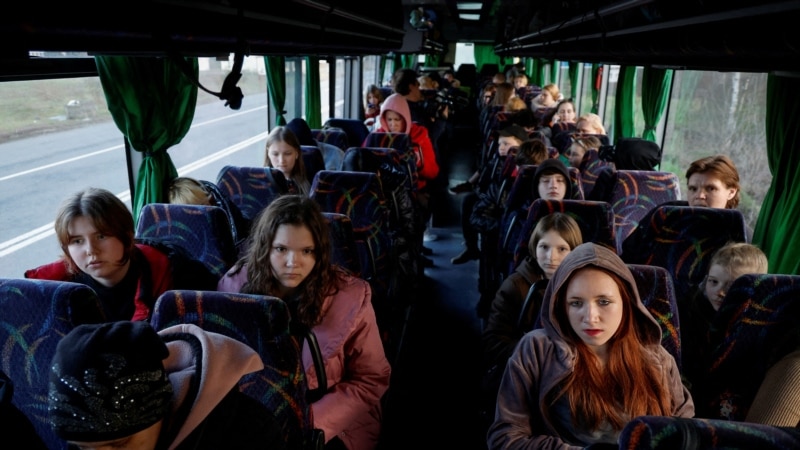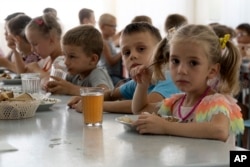Lukashenko Whitewashes His Involvement in Abducting Ukrainian Children
The Belarusian opposition in exile has accused President Alexander Lukashenko of approving the forcible transfer of 2,100 Ukrainian children from at least 15 Russian-occupied Ukrainian cities.
Pavel Latushka, an exiled Belarus former culture minister who now heads National Anti-Crisis Management, a shadow government-like organization created by Belarusian opposition, said he had handed the evidence to the International Criminal Court (ICC) in The Hague, Netherlands, on June 27.
“Ukrainian children, who were under the guardianship of the Ukrainian state, including orphans, children with disabilities and those whose parents were stripped of their parental rights, have been illegally transferred into the territory of Belarus,” Latushka told The Associated Press.
“The materials handed over to the prosecutors prove that Lukashenko has personally signed the documents under the auspices of the so-called union state of Russia and Belarus that provided a basis for organizing and funding the transfer of Ukrainian children to Belarus.”
Also on June 27, National Anti-Crisis Management released a statement saying it had presented the ICC with evidence that, along with Lukashenko, those involved in the illegal transfers included Belarusian Paralympic athlete Alexey Talay, head of the “WeTogether” organization; Union State of Russia and Belarus State Secretary Dmitry Mezentsev; and Ivan Golovaty, CEO of Belarus’ state-owned Belaruskali enterprise.
They had “committed war crimes in the form of illegal transfer of Ukrainian children from the Russian-occupied territories to Belarus and their re-education,” the statement read.
The National Anti-Crisis Management statement included a video of Ukrainian children attending a pro-Putin propaganda session at the Dubrava camp in Belarus.
The following day, June 28, Lukashenko denied his government was involved in the illegal transfer of children from Ukraine and called Latushka’s allegations “madness.”
Lukashenko said during his press conference:
“I contacted Putin, told him: Let us spend some of the money from the Union State budget on those kids… They want the Criminal Court to charge me over this. What exceptional slimeballs they are! Grasping at straws!”
That is misleading.
Lukashenko admitted to reporters that he had funded a program to bring Ukrainian children to Belarus through the Russia-Belarus union state budget.
He described his involvement with Talay’s WeTogether this way: “He has been going there and back, fetching those kids. He called me a dozen times.”
Talay ostensibly called Lukashenko’s office to elicit support for rehabilitation camps, and the Belarusian president worked out the financing for the initiative with his Russian counterpart, Vladimir Putin.
While WeTogether is apparently funded by charitable donations and joint Belarusian-Russian government support, recent investigations found deeper ties to government resources. WeTogether hosts events at the Dubrava camp, owned by the Belaruskali enterprise.
Belaruskali is a state-owned fertilizer manufacturer and one of the world’s largest exporters of potash. The U.S. Treasury Department sanctioned the firm in 2021 to limit the financial benefits it provides to Lukashenko’s regime.
The Dubrava camp’s program in Belarus is designed like the Russian “re-education” programs that have been widely criticized internationally for subjecting Ukrainian children to Kremlin propaganda and brainwashing.
The program’s sponsors tout its restorative qualities and insist such camps are sources of fun and relief for the children. But Nathaniel Raymond of the Yale University Humanitarian Research Lab pointed out that the quality of treatment is no guarantee of compliance with international law: “[T]hey can be given caviar every day, riding horses and having the best day ever, and it’s still a war crime.”
Alexey Talay told journalists back on April 28 that his program was operating with appropriate legal safeguards and rejected the oversight of international courts: “These threats and this international so-called court have no effect on the territories of certain states, since it is our right, so to speak, to accept the rules of the game or not.”
Talay justified the abduction of Ukrainian children as lawful by insisting that they are taken from the “territory of the Russian Federation” — echoing the Kremlin’s false description of the Russian-occupied territories of Ukraine.
In May, Andrzej Sados, Poland’s permanent representative to the European Union, said he had received a letter from Latushka stating that 2,000 children, largely from the occupied parts of Ukraine, had been sent to sanatoriums and summer camps in Belarus, and that Talay’s charity was among the groups responsible for unlawful deportations of Ukrainian children to Belarus.
Sados said Poland wanted the EU to impose sanctions on the Belarusian government for the deportations.
The Atlantic described in a July 1 article how “legal tricks have played out before the eyes of some Ukrainian parents” in these “relief programs.”
It featured a father who was separated from three of his children during filtration, who “later learned that the day he was detained, the children were put on a plane to Moscow.”
In June, Lithuania’s Prosecutor General Nida Grunskiene opened a pretrial investigation into the alleged criminal transfer of Ukrainian children to Belarus, based on information handed over to her by Belarusian opposition leader Sviatlana Tsikhanouskaya.
Lithuanian Justice Vice Minister Gabija Grigaite-Daugirde said on June 12 that she hoped an arrest warrant would be issued for Lukashenko:
“Since we have arrest warrants for Vladimir Putin, perhaps we will soon have an arrest warrant for Lukashenko for exactly the same kind of acts as, clearly, they are accomplices in this case.”
In March, the International Criminal Court accused Russian President Vladimir Putin and his children’s rights commissioner, Maria Lvova-Belova, of war crimes and issued arrest warrants for their role in the abduction of Ukrainian children.
Since launching a full-scale invasion of Ukraine on February 24, 2022, Russian authorities have been accused of transporting Ukrainian children out of Ukraine without the consent of guardians and of facilitating “Russification” programs.
Even legal transfers can become exceedingly murky. Parents and guardians, where they are present, are under immense pressure to evacuate children from danger and often enter agreements under duress. Russian administrators then make great efforts to obfuscate a child’s place of origin and show no intention of returning them.
The New York Times reported in April:
“Some sent their children to summer camps in the Crimean Peninsula, having been assured they would return in two weeks. Others simply yielded to pressure from officials and soldiers to let their children be taken. They all blamed themselves when they were not returned.
“… other children were transferred without warning or, like Artem, just disappeared.
“Artem had traveled to his school in Kupiansk on Sept. 7 — just as Ukrainian troops were driving out Russia’s occupation — to retrieve documents he needed for college. No bus returned that day, so he remained overnight. The next day, Russian troops turned up and loaded him and other students into military trucks.”
This article has been archived for your research. The original version from Polygraph.info can be found here.




